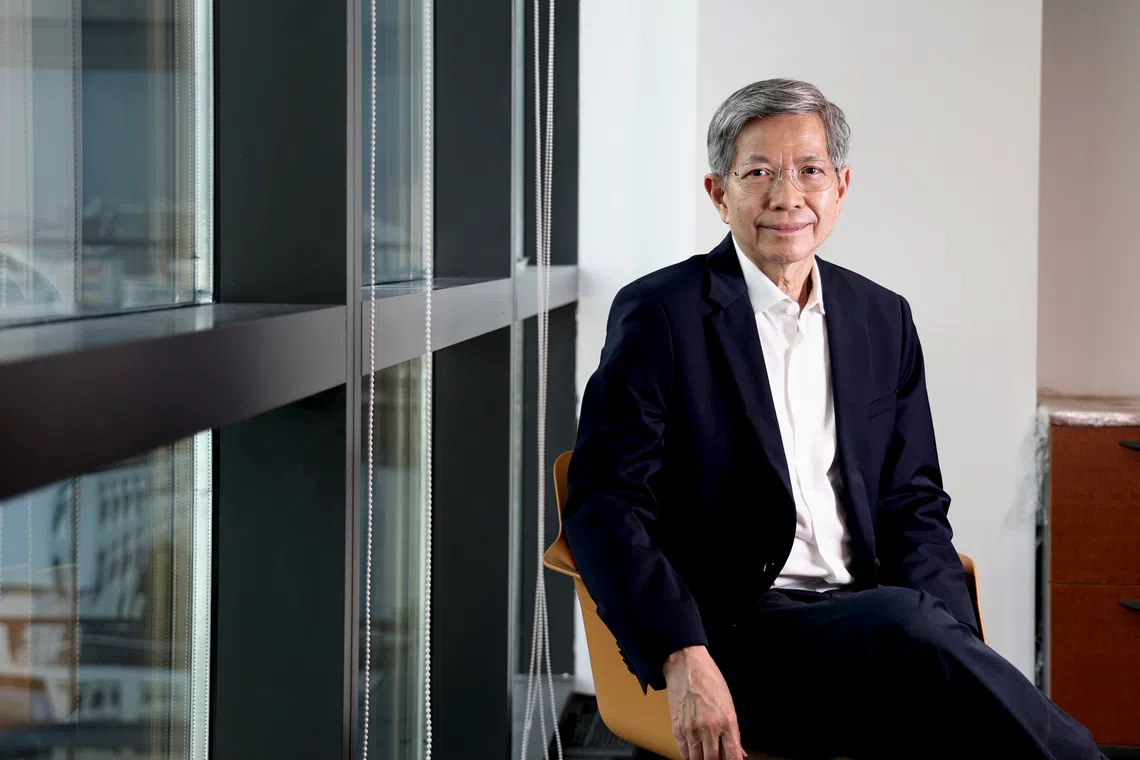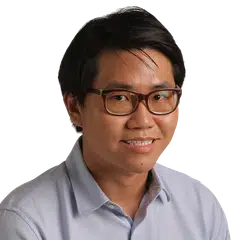CEO Insights
Don’t let AI outpace human talent, improve HR to build future-ready workforce: SNEF president
Sign up now: Get ST's newsletters delivered to your inbox

Sometimes, tables are banged as the Government, labour movement and employers hash out key workforce policy shifts for Singaporeans, said Mr Tan Hee Teck, president of the Singapore National Employers Federation.
ST PHOTO: HESTER TAN
- SNEF President Tan Hee Teck highlights the "strenuous negotiations" behind Singapore's workforce policy consensus, balancing employer interests with workforce needs.
- Tan cautions against hastily adopting AI, potentially weakening Singapore's skills base by reducing entry-level hiring and hindering succession planning.
- SNEF aims to help employers navigate challenges like offshoring and longer careers through upskilling, skills-based hiring, and HR professional development.
AI generated
SINGAPORE – In Singapore, workforce policy changes often seem to emerge with a fully formed consensus among the Government, labour movement and employers.
But this belies strenuous negotiations behind closed doors to reach compromises, said Mr Tan Hee Teck.
“Sometimes, we bang tables,” the Singapore National Employers Federation (SNEF) president lets on with a wry smile, in a 90-minute interview with The Straits Times on Oct 31.
The leader of Singapore’s employers federation declined, however, to disclose who did the table-banging or what the disputes were about, citing confidentiality.
Amid some occasional tension, the self-professed introvert exudes an unassuming wisdom, shaped by more than four decades of service spanning both the private and public sectors.
Mr Tan, 69, most recently came into the limelight after it was announced that he will replace Mr Lim Boon Heng, who stepped down as chairman of NTUC Enterprise on Oct 30.
Mr Tan cautioned that firms risk weakening Singapore’s skills base if they adopt artificial intelligence (AI) too hastily.
AI’s growing ability to potentially supplant much of the work entry-level employees do could lead to fewer new hires, and, in turn, a smaller pool of talent to groom for future leadership – something the technology itself cannot do.
“All of us need succession, so how do I replace the general manager or the senior vice-president, or the vice-president, if I’ve got nobody at the bottom?” he said.
This is also why he sought the theme “Forging the Future of Work Together” for SNEF’s 45th anniversary event on Nov 4.
He said: “We want to organise discussions for employers. We want to see where is the future. How can we mould the future so that it is satisfactory for all sides?”
He added: “We may want to tell the employer, ‘Hey, you shouldn’t let go of 100 people. Retain 20 of them, retrain them to manage (the technology).’”
Another workforce trend that needs to be carefully managed is the shifting of roles out of Singapore, usually to markets with greater abundance of sufficiently skilled workers at lower cost, or offshoring.
“Businesses can offshore some laborious tasks, and then train Singaporeans, upskill them, retrain them to have higher (level) tasks, with a better job and a better salary,” Mr Tan said.
However, this means employers will need to find ways to bring workers along in the push for higher productivity, which underpins the wage increases employees seek, while ensuring that retirement adequacy keeps pace with longer life expectancy.
To this end, Mr Tan outlined several shifts he believes are needed: a mindset change towards longer careers, where employers and workers collaborate to make jobs meaningful; skills-based hiring beyond paper qualifications; more inclusive recruitment of mid-career professionals; and helping workers cultivate greater creativity.
But who best to put all this in place, and how?
“I think the human resources profession needs to level up – seriously,” Mr Tan said.
He added: “In the old days, HR was just making sure you get your payroll; today, (it) is actually talent development.”
The father of two working adults cited his son’s experience as a product manager in Silicon Valley, where there are highly structured development schemes that are less common in Singapore – even among multinational companies with offices here.
“We’ve just started the journey to evolve towards helping employers to upskill their HR profession, because we strongly believe… that will help them in terms of their productivity and their growth.”
Mr Tan assumed his current role in SNEF around a year ago, but his involvement dates back much longer to his previous life as a top executive with the Genting Group, from which he retired earlier in 2025.
He was vice-president of SNEF from 2022 to 2024, and has been a council member for more than 15 years.
Asked what has kept him going with SNEF all this time, he said: “I think it’s the cause.”
Employers need more direct help, and in more areas, to navigate an increasingly unpredictable world amid prevailing trade volatility, the rise of AI and stiffening economic competition.
“SNEF steps in to make sure that we have a balance of supporting the employers and giving the workforce a better living,” he said.
Beyond helping members understand regulations and advocating for their interests, as in the past, the employer union is now also working to improve the talent pool accessible to employers, and securing enough talent for the long haul.
For instance, SNEF was appointed in 2023 by the Government to coordinate employers’ job redesign and retail workers’ training efforts
The federation frequently runs training sessions for its members too. Further moves are in the pipeline for the year ahead.
Mr Tan is no stranger to making tough decisions amid uncertainty.
“I had 9,000 employees in RWS (Resorts World Sentosa)… in the middle of Covid-19. I was so, so stressed, I couldn’t sleep, because my payroll (was) a million dollars a day,” he said, recounting his previous life as chief executive of the integrated resort.
Yet, good employers must strike a balance between gearing up to seize new opportunities quickly once the fog lifts, and survival in the interim, he said.
It is this practical experience that has made Mr Tan a sought after figure for board appointments and policy review groups – including with the Central Provident Fund Board and Anext Bank, a digital bank part of Alibaba’s Ant Group fintech arm.
More recently, he was selected to the Singapore Economic Resilience Taskforce, set up by Prime Minister Lawrence Wong to help businesses and workers navigate uncertainties arising from US tariffs and other global developments.
He said businesses tell him Singapore’s predictable regulations, rule of law and strong suite of English-speaking professional services such as law and consulting, place the Republic ahead of regional competitors.
“So far, Singapore has been able to be ahead of the curve, from the South-east Asian perspective.”



